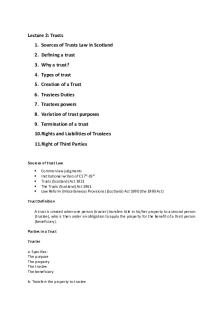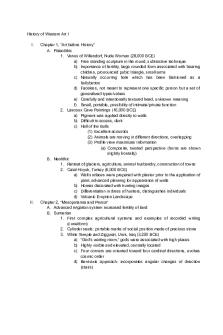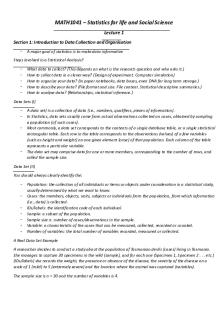Freedom:Liberty notes PDF

| Title | Freedom:Liberty notes |
|---|---|
| Author | Tabassum Rahman |
| Course | Political Ideas |
| Institution | University of Southampton |
| Pages | 7 |
| File Size | 504.5 KB |
| File Type | |
| Total Downloads | 74 |
| Total Views | 120 |
Summary
Lecturer: Ben Saunders...
Description
Questions
PAIR 1004: Political Ideas 2. Freedom (or Liberty)
• Conceptual: What is it for X to be free or unfree? That is, what things limit freedom? • Normative: What should X be free or unfree to do? That is, when should freedom be limited?
Dr Ben Saunders ([email protected])
2
Liberty - Four Essays on Liberty (2002) Two Concepts of Liberty (1958)
Concepts or Conceptions? • Are these two understandings of the same thing? • Or are they completely different things? • That is, is
Negative Liberty - “The freedom which consists in not being prevented from choosing as I do by other men…”, pg. 178-9 (2002) 4
Positive Liberty (self-mastery) - “The ‘positive’ sense of the word ‘liberty’ derives from the wish on the part of the individual to be his own master.”, pg. 178 (2002)
The Social Contract (1762)
Negative and Positive Freedom (1967)
MacCallum’s between a
• and
, or , etc.
• Can others force you to be free? •
Example: Person X is free from social pressure (y) to do a Fine arts degree (z) 5
6
“It is one thing to say that I may be coerced for my own good, Example: Agent X is understood to be a higher rational/ which I am too blind to see: this may, on occasion, be for my true self but there are phobias (y) that limits him to benefit; indeed it may enlarge the scope of my liberty. It is becomes this self (z) another to say that if it is my good, then I am not being coerced, for I have willed it, whether I know this or not, and am free (or ‘truly’ free) even while my poor earthly body and foolish mind bitterly reject it”. Berlin (2002), p. 180.
1
18/02/2017
The Inner Citadel
Branching Paths
• It’s a mistake to focus only on what you currently want. • . • Also, this implies you can . • Retreat to the
.
The more free you are = more paths open to you The less free you are = less paths open to you
7
8
Does it really matter how many paths are limited to you? Does it matter as long as the one path you want is open? Yes, your freedom is limited because you cant do those other paths but does it matter i that one path you want is open to you?
Options
Quality as well as Quantity
• We have to consider
• It’s a
to
.
.
therefore depend on – whether
•
• We care also about the . Care not only about the number of options you have but also how good those options ar .
• E.g.
Consider not only the things you want to do, but the things you MAY want to do 9
example of
.
“We recognize that religion has been abolished in Albania, whereas it hasn’t been in Britain. But on the other hand there are probably far fewer traffic lights per head in Tirana than in London.... In sheer quantitative terms, the number of acts restricted by traffic lights must be greater than that restricted by a ban on public religious practice. So if Britain is considered a free society, why not Albania?” Taylor (2006), pp. 150-1. 10
If we look at the number of options of albania under communism, they could still be as free as britain per say because although public practice of religion is banned, Albanians have more options to do things like not having to stop at as many traffic lights than Britain
Free and Forced
The Y term
• You can be
• We’re
with
.
. • This is
.
(i.e.
• voluntarily)’.
You may be free to do something (no one is stopping you to do Z) but that doesn’t mean you chose to do that thing/action “(1) C is the inhabitant of a city, located in the middle of a desert, which she is free to leave. However X, who would wish to leave, knows with absolute certainty that if she leaves the city she will not be able to survive the hardship of the desert and she will die. Her choice to remain in the city is not a voluntary one. (2) C1 is the inhabitant of a [sic] insurmountably walled city which she is unfree to leave. However, her city has all that anyone could ever ask for and C1, aware of this, has no wish to leave it. She voluntarily remains in the city.” Olsaretti, pg. 71 (1998) 11
•
.
Most of the debate accepts that natural limits do not count as restraints against freedom, “Coercion implies the deliberate interference of other human beings within the area in which I could otherwise act. You lack political liberty or freedom only if you are prevented from attaining a goal by human beings” - Berlin (2002), pg. 169 12
2
18/02/2017
Freedom vs. Ability
The Origin of Obstacles
•
• Whether an obstacle limits one’s freedom may – whether it is or .
. • You’re unable to fly, but
• Fallen tree. • Broken legs. • Poverty.
–
Fallen tree on a road - if it naturally fell from a windy day then we are unable to to go through the road but we are not unfree to do to it. Broken leg - If someone broke your leg to prevent you from running, then you can complain that your ability and FREEDOM to run had been taken away. Poverty - Neo-Marxist ideology - workers are deliberately kept poor and exploited by the rich capitalists to avoid them rising against the system
• N.B.
13
14
“It is only because I believe that my inability to get a given thing is due to the fact that other human beings have made arrangements whereby I am... prevented from having enough money with which to pay for it, that I think myself a victim of coercion or slavery.... I begin to speak of being deprived of freedom (and not simply of poverty) only if I accept the theory.” - Berlin (2002) pg.170
Free as a Bird?
Unfree as a Subset of Unable 1.
2.
. You are only able to ɸ
in the air.
from ɸ-ing, so you ɸ.
Birds are typically though to be free, the ability to fly makes them free to do other things unlike humans 15
, e.g. jump 10’
3. because =
.
1) With no human prevention, when you are able to do something - you are FREE, you have FREEDOM to do this act 2) If you are naturally unable to do something this doesn’t make you unfree, therefore there is no point for you to protest against this 3) Unable to do something because of human intervention, makes you unfree - which you are allowed to protest and complain against this 16
Do Walls and Fences Limit Freedom?
Non-Free
• I have assumed that
• Perhaps there is a . • Compare:
(in all
• cases).
• moral, immoral, and amoral. • voluntar y, involuntary, and non-voluntary.
The actions of animals, are not seen to be relating to morality. But if a human does the same act as eating another living object, like an animal, there would be a moral concern over this human. Moral actions are done by humans that are considered ‘good’/‘right’ Immoral actions are done by humans that are considered ‘bad’/‘wrong’ Voluntary actions are non moral actions that you want to do Involuntary actions are non moral actions that you do not want to do Non-voluntary actions are irrelevant to your will, for example you don’t will to breathe 17
• Here are three dissenting views…
Berlin Wall (collapsed 1989)- limits the ability of the German people of the soviet area of Berlin and Germany to refuge/move onto the west side of the Berlin wall, but was collapsed under Gorbachev and the Western allies 18
3
18/02/2017
John Locke
1) Blocking Bad Options
2) A Right to Interfere
• “[T]hat
, e.g. a fence to keep
• ”
you off my land.
(Locke, ch. VI, sec. 57).
John Locke, the confinements against us are not even losses at al • Is this because of
?
• Why not admit the loss? (Berlin)
• But then a justly sentenced prisoner does not appear to be unfree! • As a
This loss of freedom is not necessarily bad , for example if there are gates to prevent you from falling off a cliff. It is not a significant loss of freedom, rationally we don’t even want to fall off a cliff anyways 19
, this seems
.
Landowner builds a fence around their land, this fence does not interfere with your freedom because you did not have the right to be in that land owner’s land/property anyways. If someone has been properly convicted of violating a law, because they have forfeited certain rights (freedom of movements), there actual freedom hasn’t been removed / hasn’t been lost. Since they had no moral right to commit that act anyways thus wont make that prisoner unfree (counter intuitive implications) 20
Conceptual vs. Normative
3)
• Perhaps these thoughts
• It sounds absurd to say that you are unfree to do ɸ, with the . • Thus, limits on freedom must make ɸ-ing impossible.
, but they
• still
.
Murder needs a justification/freedom for its ability to restrict our freedom but this is a law because its restriction of our freedom is based on the idea that this restriction does more GOOD than bad, thus is acceptable in our society
• Mere threats do not limit freedom.
e.g. Speeding at 60mph, you are free to do it but it has counterintuitive implications, for example its illegal
21
22
“Interventions of an offering or threatening kind effect changes either in individuals' relative desires to do certain actions or in the evaluative status assigned to their doing certain actions.” Steiner - 1974, pg.43
Constraints on Freedom - David Miller
Miller’s Response
So What is a Constraint?
• We want to
from
• One possibility: . • But this may be
•
. • Second possibility:
• At some point,
• But my action may
.
.
Punishments exist to hinder our ability to do an act, but it doesnt make us unfree but LESS free
If your punishment is too severe, then you are unfree to do the thing in question 23
24
“If a small penalty is attached to an action I am contemplating, I shall probably say that I am now less free than I was to undertake the action. As the penalty is increased, there will come a point (depending partly on the value of the action to a normal person) where no one would reasonably perform the action with that penalty attached. At that point, I shall probably say that I am unfree to do A, full stop.” - Miller (1983), pg. 78
4
18/02/2017
Miller’s Proposal • An action that
The Office Door is a (and not merely your
ability) if and only
• Your freedom can be
A blockage against your actions are a constraint on your freedom, only if that blocker is morally responsible for it. A judge that sentence a prisoner, are morally commendable for their action but are nonetheless morally responsible 25
26
Locked in an office
“[T]he passerby is so placed that he could if he wished release me, but in the circumstances he has no obligation to do so. From a causal point of view his omission is partly responsible for my confinement, but from a moral point of view he is not responsible at all.” Miller (1983), p. 72.
Six Scenarios
Assessments
• 1. Y knowingly shuts me in. • 2. Y closes the door without checking. • 3. The door blows shut; Y fails to check. • 4. The door blows shut. I call out to a passerby, but she leaves it to Y. • 5. Y checks the room, but I am hiding, and he shuts me in.
Scen. Door Obligation shut by violated? 1 Y Yes Unfree
Unfree
2 3 4
Y Wind Wind
Yes Yes No
Unfree Unfree Free
Unfree Free Free
• 6. The door blows shut; no one is assigned to check.
5 6
Y Wind
No No
Free Free
Unfree Free
27
28
Oppenheim’s Alternative
Miller’s Response (1)
• Your freedom is
• Oppenheim’s notion of constraints is
(and only where)
.
• Human agency • Objection: which makes it
, • E.g. the discarded apple core.
A locked door, if its not caused by human agency its just a natural obstacle. If it is caused by human interference then it is something that affects your real freedom 29
The discarded apple core, could lead to future constraints - e.g. littering could block other people’s path 30
5
18/02/2017
Miller’s Response (2)
A ‘Third Way’
• Oppenheim’s notion of constraints is
.
, neither negative
• nor positive.
• Oppenheim thinks that , rather than a constraint.
• Republican freedom . =
•
Imagine you stood and watched a rock fall on someone and make them stuck, rather than act - Oppenheim would see as this an issue irrelevant of morality, miller would count you as morally responsible as you could have prevented this constraint of freedom 31
32
Slavery
Different Counterfactual
• Paradigm example: the slave.
• The
of freedom ?
, whether or not s/he does.
• • Similarly,
• The counterfactual here concerns the – if you were to do Z,
.
• So may an employer, a partner, a bully, etc.
33
What’s Bad About Domination?
Freedom as a •
34
, so conceived, rather than actions.
• There’s
,
, it’s no worse than natural limits. , or person, as
• opposed to being (like) a slave.
•
, however, – this introduces an
• This
.
35
36
6
18/02/2017
Avoiding Domination
Is this Negative?
• Freedom can be
.
• It
Checks and balances prevents arbitrary rule by a President
, but here an (rather than interference).
• Ensure that • You can be
• And you can be
•
37
Typology
Is this Freedom?
Interfered with Dominated
Not dominated
38
Not interfere interfered d with
• The slave example seems compelling.
Both liberals and Liberals regard this republicans regard as freedom. this as unfreedom. Republicans regard it as unfreedom.
• But what of someone who is
•
Liberals regard this Both liberals and as unfreedom. republicans regard Republicans regard this as freedom. it as freedom. 39
40
Non-Freedom Again
A Further Objection
• Republicans can also
• The
does
. • Liberals as
• Only • But leaving you
, as well
, • But
.
41
.
42
7...
Similar Free PDFs
Popular Institutions
- Tinajero National High School - Annex
- Politeknik Caltex Riau
- Yokohama City University
- SGT University
- University of Al-Qadisiyah
- Divine Word College of Vigan
- Techniek College Rotterdam
- Universidade de Santiago
- Universiti Teknologi MARA Cawangan Johor Kampus Pasir Gudang
- Poltekkes Kemenkes Yogyakarta
- Baguio City National High School
- Colegio san marcos
- preparatoria uno
- Centro de Bachillerato Tecnológico Industrial y de Servicios No. 107
- Dalian Maritime University
- Quang Trung Secondary School
- Colegio Tecnológico en Informática
- Corporación Regional de Educación Superior
- Grupo CEDVA
- Dar Al Uloom University
- Centro de Estudios Preuniversitarios de la Universidad Nacional de Ingeniería
- 上智大学
- Aakash International School, Nuna Majara
- San Felipe Neri Catholic School
- Kang Chiao International School - New Taipei City
- Misamis Occidental National High School
- Institución Educativa Escuela Normal Juan Ladrilleros
- Kolehiyo ng Pantukan
- Batanes State College
- Instituto Continental
- Sekolah Menengah Kejuruan Kesehatan Kaltara (Tarakan)
- Colegio de La Inmaculada Concepcion - Cebu















